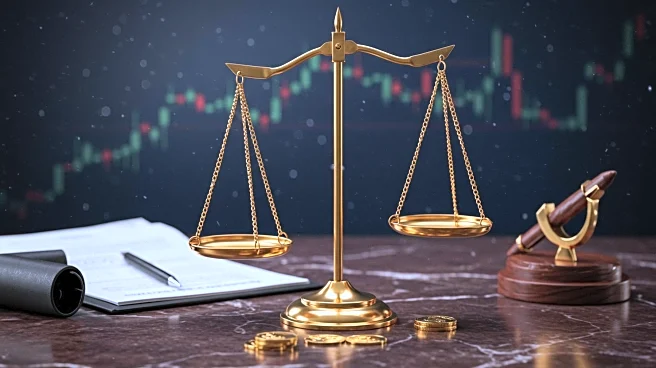What's Happening?
Federal Reserve Chair Jerome Powell is set to address the annual Jackson Hole economic conference amid significant pressure from President Trump and mixed economic data. Investors and President Trump are anticipating a potential interest rate cut when the Federal Reserve meets next month. However, inflation remains above the Fed's 2% target, and the impact of President Trump's import tariffs is expected to further increase retail prices. Kansas City Fed President Jeffrey Schmid has expressed caution about lowering rates while inflation is still high, emphasizing the importance of maintaining the Fed's credibility in controlling inflation. Powell's upcoming speech is expected to reveal a new Fed operating framework and may hint at a possible rate cut in September, although it is unlikely to satisfy President Trump, who advocates for a more substantial reduction.
Why It's Important?
The potential decision on interest rates by the Federal Reserve holds significant implications for the U.S. economy. A rate cut could provide a boost to the labor market, which some analysts believe is weakening faster than employment data suggests. However, lowering rates amidst rising inflation could undermine the Fed's credibility and send a concerning message to consumers. The political pressure from President Trump adds complexity to the Fed's decision-making process, as any move could be perceived as either capitulation to or defiance of the administration. The outcome of this decision will impact investors, businesses, and the broader economic landscape, influencing market confidence and economic growth.
What's Next?
Jerome Powell's speech at the Jackson Hole conference will be closely watched for indications of the Fed's future policy direction. If Powell signals a willingness to cut rates, it could provide temporary relief to the labor market and appease some political pressures. However, the Fed must balance this with the risk of exacerbating inflation. The political context, including President Trump's calls for resignations within the Fed, may further complicate the institution's independence. The potential turnover of Fed board members in 2026 could also influence the Fed's policy direction, depending on the administration's ability to appoint new members.
Beyond the Headlines
The ongoing tension between the Federal Reserve and the White House highlights the challenges of maintaining central bank independence in a politically charged environment. The Fed's decisions are not only economic but also carry significant political weight, as they can affect public perception and confidence in the institution. The broader implications of this dynamic could lead to shifts in how monetary policy is perceived and implemented in the future, potentially affecting the Fed's long-term role in stabilizing the U.S. economy.










